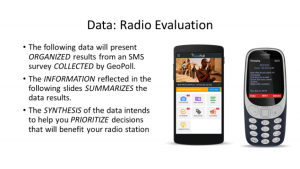A key element of USAID Transforms, and similar initiatives, is the idea that the purpose of foreign aid is to end the need for its existence. This shift requires a strong emphasis on local capacity building, so local governments, NGOs, and the private sector have the systems in place to ensure self-reliance. At the same time, the use of data in the development field is growing exponentially, with a variety of organizations across the globe collecting more and more data from multiple sources across the entire program lifecycle. However, a lack of knowledge on how to analyze, interpret, and use all this data is a bottleneck to improving development effectiveness for both international and local groups. GeoPoll is using our expertise in mobile data collection and analysis to train leading local organizations in how to gather information and use it to better serve the communities they work with, furthering the goals of USAID Transforms.
The training on data-driven decision making for international development
 On June 2, 2018 in Dar es Salaam, GeoPoll’s Audience Measurement Specialist, Akinyi Okulo, led an Introduction to Data-Driven Decision Making – Radio Media training. 25 participants from 20 Tanzanian community radio stations engaged in the training seminar, under the five-year USAID-funded Tanzania Media and Civil Society Strengthening (TMCS) Activity. Also known as Boresha Habari, the FHI 360-led TMCS Activity’s goal is to strengthen Tanzania’s media ecosystem by building the local capacity of media outlets through training and technical assistance.
On June 2, 2018 in Dar es Salaam, GeoPoll’s Audience Measurement Specialist, Akinyi Okulo, led an Introduction to Data-Driven Decision Making – Radio Media training. 25 participants from 20 Tanzanian community radio stations engaged in the training seminar, under the five-year USAID-funded Tanzania Media and Civil Society Strengthening (TMCS) Activity. Also known as Boresha Habari, the FHI 360-led TMCS Activity’s goal is to strengthen Tanzania’s media ecosystem by building the local capacity of media outlets through training and technical assistance.
To further this goal at the GeoPoll-led training, GeoPoll staff provided trainees with nationally representative audience measurement data that measured specific program indicators. GeoPoll also trained Tanzanian media stakeholders on practical ways of using audience measurement data to improve the quality of community radio programming, increase listenership, and generate additional advertising revenue—all of which is intended to strengthen Tanzanian civil society and improve democratic governance.
GeoPoll planned and led the highly tailored day-long training with the goal of improving the use of data to drive programming decisions among Tanzanian community radio stations. The training combined theoretical learning with real audience measurement data and practical group exercises.
 Akinyi first led the participants through a well-known theoretical framework on data-driven decision making that focuses on the relationship between information, data, and knowledge. With this high-level framework in mind, trainees then analyzed real Tanzanian audience measurement information for radio that GeoPoll had collected before the session, as well as nationally representative GeoPoll SMS survey results that provided insight on Tanzanian perceptions and opinions about radio.
Akinyi first led the participants through a well-known theoretical framework on data-driven decision making that focuses on the relationship between information, data, and knowledge. With this high-level framework in mind, trainees then analyzed real Tanzanian audience measurement information for radio that GeoPoll had collected before the session, as well as nationally representative GeoPoll SMS survey results that provided insight on Tanzanian perceptions and opinions about radio.
To bridge the gap between the theoretical framework and the practical application of data, participants took part in small group exercises. The group exercises focused on drawing out specific data points from real GeoPoll survey results and then designing advertiser strategies based on the data analysis and interpretation.
The training was a great success. Local stakeholders were educated on a mix of theories and developed practical knowledge about evidence-based decision making within media. In this way, GeoPoll is working to support a sustainable, self-reliant, and locally lead community radio ecosystem within Tanzania.
Let GeoPoll train your team on data driven decision making
GeoPoll is a leader in collecting data in emerging markets. With years of experience, our staff are extremely knowledgeable about both data collection and analysis. The GeoPoll team can impart this knowledge upon your staff through a similar training on data-driven decision making. Contact us today to discuss the training possibilities for your organization.



